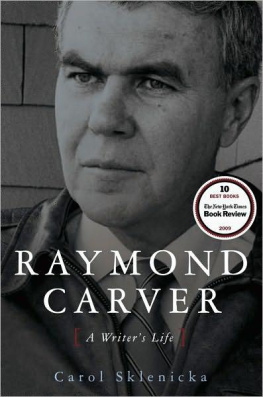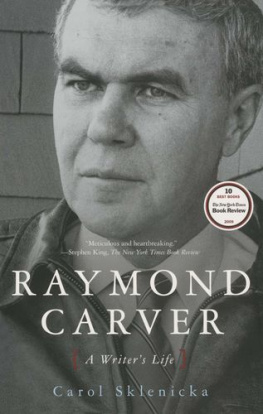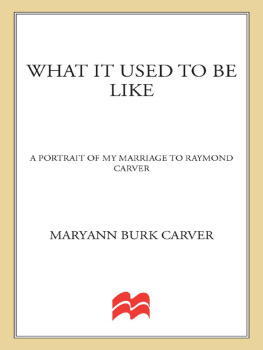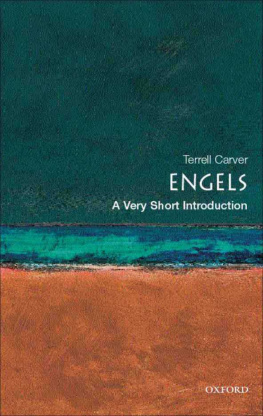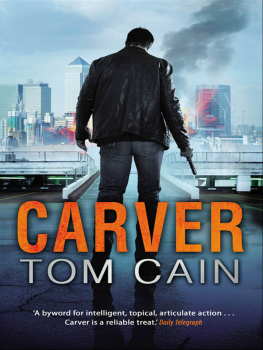
Also by Carol Sklenicka
D. H. Lawrence and the Child
RAYMOND CARVER
A Writers Life
Carol Sklenicka


SCRIBNER
A Division of Simon & Schuster, Inc.
1230 Avenue of the Americas
New York, NY 10020
www.SimonandSchuster.com
Copyright 2009 by Carol Sklenicka
All rights reserved, including the right to reproduce this book or portions thereof in any form whatsoever. For information, address Scribner Subsidiary Rights Department, 1230 Avenue of the Americas, New York, NY 10020.
First Scribner hardcover edition November 2009
SCRIBNER and design are registered trademarks of The Gale Group, Inc., used under license by Simon & Schuster, Inc., the publisher of this work.
For information about special discounts for bulk purchases, please contact Simon & Schuster Special Sales at 1-866-506-1949 or business@simonandschuster.com.
The Simon & Schuster Speakers Bureau can bring authors to your live event. For more information or to book an event, contact the Simon & Schuster Speakers Bureau at 1-866-248-3049 or visit our website at www.simonspeakers.com.
Manufactured in the United States of America
1 3 5 7 9 10 8 6 4 2
Library of Congress Control Number: 2009027291
ISBN 978-0-7432-6245-3
ISBN 978-1-4391-6058-9 (ebook)
The author gratefully acknowledges permission from the following source to reprint material in their control: New Directions Publishing Corp. for A Unison by William Carlos Williams, from The Collected Poems, Volume II, 19391962, copyright 1948 by William Carlos Williams. Reprinted by permission of New Directions Publishing Corp.
For insert photograph credits, see p. 549.
For Rick
All the stories never told: petals shaken from the rose.
R. M. Ryan
Contents
Introduction
We can never know what to want, because, living only one life, we can neither compare it with our previous lives nor perfect it in our lives to come.
epigraph to Raymond Carvers Where Im Calling From, quoted from Milan Kunderas The Unbearable Lightness of Being
Few American short story writers have been celebrated as Raymond Carver was in the 1980s. Because his spare, colloquial prose hints at something absent and mysterious, critics called him the father of minimalist fiction. Writers and writing teachers revered and imitated his style. Readers loved his grim, often funny, sometimes transcendent stories about the lives of the working poor. He wrote about their money problems, alcoholism, embittered marriages, and disaffected children; about muted, interior crises brought on by bad luck or neglect rather than intent. Carver knew that territory because he lived in it for much of his life.
Carver paid a high price for the experiences that served his art.
When printers galleys arrived for his first book of short stories, Will You Please Be Quiet, Please?, Carver and his wife, who was a schoolteacher, had just been released from their debts by a federal bankruptcy court. Carver drank vodka while he corrected the pages at his dining room table in Cupertino, California.
On the day after the books publication in March 1976, two of Carvers friends arrived at his house early in the morning. They didnt come to celebrate the book that would become a National Book Award finalist. They came to drive him and his wife to his trial at the county courthouse; he had been charged with lying to obtain unemployment payments. As they all departed, Maryann Carver took a shiny, white book from a stack on their table. The book was dedicated to her, a fruit of their nineteen married years. She would show it to the judge as evidence that her husband was still a man with prospects. She hoped to be able to keep him out of jail. She would explain that he was the victim of unfulfilled dreams and alcoholism.
Indeed, Will You Please Be Quiet, Please? was a career-launching book. Carver, then thirty-eight, had published in literary magazinesplus two stories in Esquirebut this first book had been a long time coming.
It came almost too late.
Alcohol had ruled Carvers life for longer than he cared to admit. Lying to the state of California was hardly the worst offense Carver had committed as he capitulated to late-stage alcoholism. Everything, he wrote later, that he and Maryann held sacred, every spiritual value, [had] crumbled away.
Carvers fate had closed in on him when he suffered an alcoholic withdrawal seizure in the lobby of a clinic where hed just been detoxified. A doctor told him then that hed risk irreversible brain damage if he drank again; that first book could be his last. Despite the dire warning, Carver continued to drink, detox, and relapse for another two years. As he became sicker and sicker, he hid the severity of his problem more cunningly from everyone but his family and close friends. These people worried, but they couldnt influence him.
Yet Carver finally turned his life around, becoming one of the rare exceptions in a long line of hopelessly alcoholic American authors. When he finally quit drinking, he made the decision alone. That day of his last drink was the natal day of his new life, the beginning of the decade he described as gravythe sauce that enriches an ordinary meal.
In his eleven sober years, Carver made difficult decisions that changed his work and his circumstances. He relished the rewards, affection, and freedom that came his way. When he died in 1988, Where Im Calling From, a selection of his short stories that the New York Times named a favorite book of the late twentieth century, had just been published; he had just completed his third collection of poetry in five years. His work appeared in twenty-two languages and the Times of London called him the American Chekhov. He was a full-time writer, acclaimed by the press and supported by royalties from his books and a generous five-year grant from the American Academy and Institute of Arts and Letters.
In the end, though, Carver measured his own success by what hed come through and by the work that he believed would survive him. He wasnt a saint, and his sobriety wasnt perfecthe remained a nervous, obsessive, and lovably boyish man addicted to cigarettes and reliant on marijuana. But he credited his productive final years to not drinking: Im prouder of that, that Ive quit drinking, than I am of anything in my life.
Carver liked to say he had two lives, and sometimes he spoke of two people, Bad Ray and Good Ray, viewing himself with the bemused, kindly detachment he held for his fictional characters. Of course, he was one man with one life. Bad Ray and Good Ray together were messier and more human than his dichotomy supposed.
Carver acknowledged the irrevocable singleness of his life when he selected as an epigraph to his final volume of stories a quotation from Milan Kundera that speaks of the impossibility of knowing what to want or of perfecting oneself within one lifetime. Carver became a more confident and luckier man when he stopped drinking, but he didnt become a different man. In recovery, he accepted himself and marveled at his own achievements. His intention to write well remained his true north.
PART 1
BEGINNINGS
CHAPTER 1
Raymond Junior
19291940, from Arkansas to the Pacific Northwest
Next page
